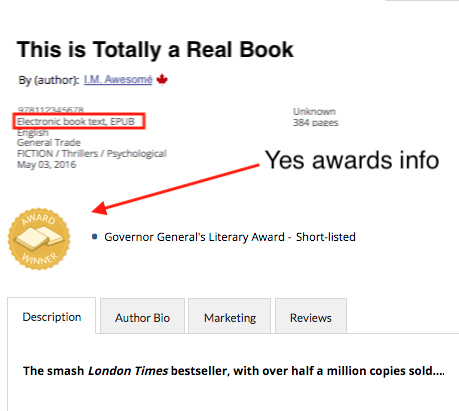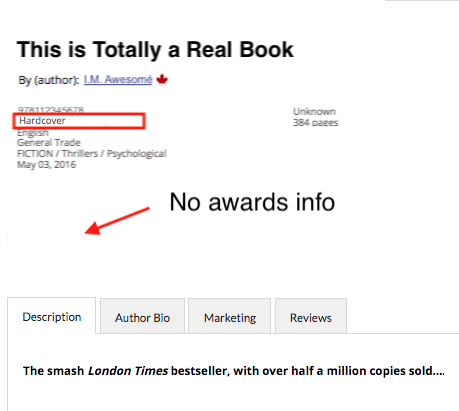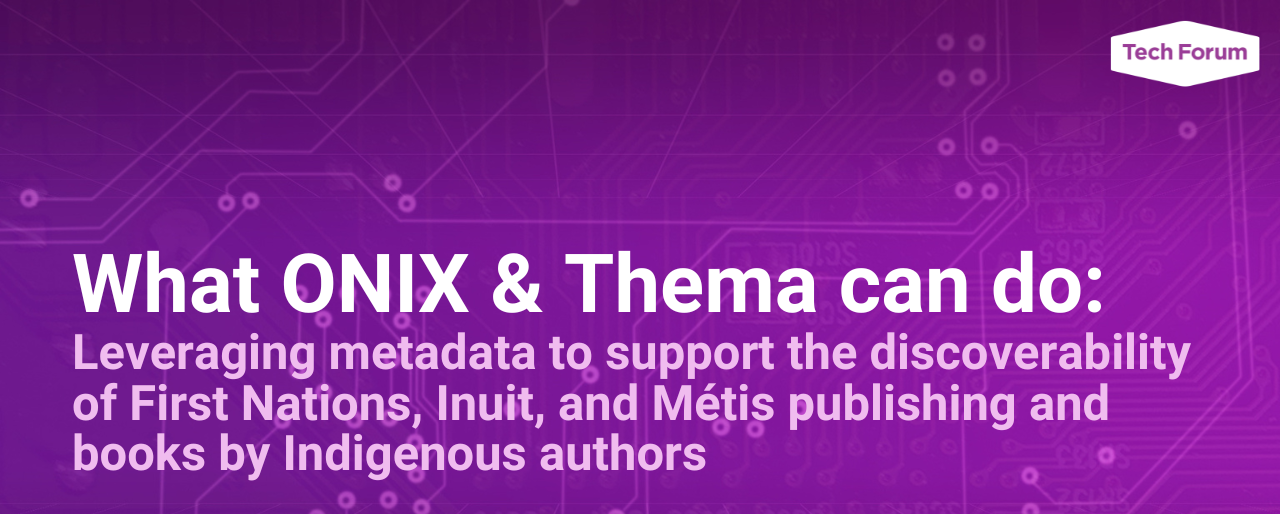Good news travels fast — but it doesn't travel everywhere. Or rather, it doesn't travel everywhen. Admittedly, that's not a word (it could be a celebrity baby name, though) but it does stress a point that's sometimes overlooked when marketing a book nowadays: You don't know when people are going to find things. Sure, you want to strike while the iron's hot and make the most out of novelty when your book first publishes, but there are things out there that can and will reheat the iron: awards and prizes.
While the merit of a book can't only be measured by awards or prizes, any external recognition can be a sales or discoverability booster for readers and retailers alike (and libraries, but it didn't have that "R" sound), so you want to make sure it's reflected in your metadata. All of this is under the assumption that your book has won the award, rather than the author specifically (like for a lifetime achievement award) or for a single edition (like a prize for cover design). To do this effectively, equip each of your formats with said booster by updating each and every record related to your book whenever something relevant occurs. That's right: all your metadata. If you don't, well, we have seen some things.... horrible, awful, not-at-all efficient or organized things, such as:
No award info included in new formats of the book
Award info found NOT in the ONIX record of the book that won the award, but in the metadata of the sequel or another book by the same author (really don't do this one)
Award info left as "longlist" years after it won the award
Updating the publisher's website, but not the book's metadata, with award info
Listing only a year's worth of awards
"Best of" lists being completely excluded (people wait all year for those!)
Award info put into the wrong section of the metadata and therefore lost to the ether
Misspelled or inaccurate award names or dates (hey, we're all human)
All of the above are bad.
But that's the beauty of ONIX: What once went wrong can be set right. And you can even change it to something right-er down the line if need be. Award and prize information should be a wonderful, easy, unifying piece of data that connects all of us — but it's currently a bit of a treasure hunt. So we created our own hunt to help publishers disseminate this crucial information throughout the supply chain, complete with steps (and puns!).
1. One data source to rule them all
90% of the above problems come down to workflow because awards season can come at you like a flash flood, and some data just gets swept away.
It also depends on the ONIX editor you've chosen. Some are fantastic and require a one-time input of data that spits out the XML you need. Others require more repetition. But whatever you've chosen, you should construct a workflow that keeps your data close and your XML closer.
If you haven't invested or constructed a central database to keep your bibliographic information in order, we HIGHLY suggest you do so now. And we don't mean go out this second and spend a ton of money on a licensed database* (although you could if you want to, how would we stop you?) but by this point you should have an internal organizational system that somehow links and lends a semblance of order to your catalogue. If you have to go looking through multiple spreadsheets to connect the ISBNs, that is... not good. You should be able to locate any piece of information for your book as well as any auxiliary files at a moment's notice. You never know when a cover image on a retailer's website could go kaput, a description wiped, or the spelling of an endorser's name contested. Have one master source — even if your ONIX or books are distributed via a third-party. You should always know where your product is.
*That being said, if your ONIX editor is forcing you to manually update each individual format of the same book, you might want to look into new options.
2. Celebrate, then update
You get that email, phone call, and/or rock through the window that tells you, "Congratulations! You've been nominated..." and you feel like celebrating, as you should! But that celebratory feeling should not end there — it's not over until it's in your metadata. Sometimes it's faster and easier to just crack open the ONIX, copy, and paste, especially for something like an award, which is a fairly easy to add. The prize composite can be repeated as many times as you need it to and it's quick to update (which must be why publishers are always saying that "going from 'shortlist' to 'win' is a dream," right?).
| ONIX 2.1 Method | |||||
|---|---|---|---|---|---|
| In ONIX 2.1 both prizes and awards are captured in PR 17 (even though it's called the "Prize Composite"). | Name | Notes | List | Tag | Short Tag | Example "Governor General's Literary Award - Shortlisted" |
| Prize/Award name | Mandatory | Free text | <PrizeName> | <g126> |
Awards2.1 <Prize> <PrizeName>Governor General's Literary Award</PrizeName> <PrizeCountry>CA</PrizeCountry> <PrizeCode>04</PrizeCode> </Prize> |
| Prize/Award year | Technically optional | YYYY | <PrizeYear> | <g127> | |
| Prize/Award country | ISO | List 91 - ISO | <PrizeCountry> | <g128> | |
| Prize/Award achievement code | Did you win? Were you shortlisted? Longlisted? Why would someone ever not include this? | List 41 | <PrizeCode> | <g129> | |
| Prize/Award jury | For name dropping, primarily. Did Oprah vote for your book? You might want to share that with the rest of humanity. | Free text | <PrizeJury> | <g343> | "Best of" lists - PR.15 |
| The only reason we can think of for why there isn't an outright, standard way to express being listed on a "best of" list in ONIX 2.1 is that they didn't really exist in the mid-2000s. That or everyone was doing their own thing and it was yet another reason why 3.0 was implemented. If you're looking for best practices, our best recommendation is to switch to 3.0 and use the below information. If you're looking for best practices in 2.1, our best recommendation is to stretch the review quote usage. | Name | Notes | List | Tag | Short Tag | Example: "Globe and Mail Best Books of the Year 2018" |
| Other text type code | Mandatory | List 33 | <TextTypeCode> | <d102> |
Bestof2.1 <OtherText> <TextTypeCode>08</TextTypeCode> <Text>One of the Globe's 100 best books of 2018</Text> <TextTitleSource>The Globe & Mail</TextTitleSource> <TextPublicationDate>2018</TextPublicationDate> </OtherText> |
| Format | "Eh" or "optional." Best usage comes after reading through this. | List 34 | <TextFormat> | <d103> | |
| Other text | Mandatory | Free text | <Text> | <d104> | |
| Title source of other text | Mandatory (for our purposes) | Free text | <TextSourceTitle> | <d108> | |
| Publication date of other text | You really should. We'll make it easy on you: Just put the year. |
YYYY | <TextPublicationDate> | <d109> | ONIX 3.0 Method |
| Luckily 3.0 and 2.1 are nearly identical — but there's a sweet addition to this repeatable composite. The Prize Statement allows for HTML formatting so you can jazz up your announcement any way you wish, BUT (and this is a big "but" which is why it's capitalized) it's not a substitute for the fields that come before it. It's an addition, not a replacement (two layouts are better than one). | Name | Notes | List | Tag | Short Tag | Example "Writers' Trust Fiction Prize - Winner" |
| Prize/Award name | Mandatory | Free text | <PrizeName> | <g126> |
Awards3.0 <Prize> <PrizeName>Writers' Trust Fiction Prize</PrizeName> <PrizeYear>2018</PrizeYear> <PrizeCountry>CA</PrizeCountry> <PrizeCode>01</PrizeCode> <PrizeStatement>Winner of the 2018 Writers' Trust Fiction Prize</PrizeStatement> </Prize> |
| Prize/Award year | "Actual question: Why would this ever not be included? | YYYY | <PrizeYear> | <g127> | |
| Prize/Award country | ISO two-letter codes. (Technically it's optional.) | List 91 | <PrizeCountry> | <g128> | |
| Prize/Award achievement code | Tell us how you did. | List 41 | <PrizeCode> | <g129> | |
| Prize/Award statement | Kind of silly NOT to take advantage. | Free text | <PrizeStatement> | <x503> | "Best of" lists - P.15 |
| Within the P.15 composite, P.15.5 is going to be your new best friend! If you're including "best of" lists in your metadata, the source and the date published should ALWAYS be included. A good rule of thumb is to treat these instances as you would any review quote. You must cite the source, and this includes a date and (hopefully) a direct link. If the list is published simultaneously online and in print, use "01" in Source Type (List 157), "Print," because the addition of a URL will imply that the source is both print and online. Use "02," "Website," for media that is considered web-exclusive. | Name | Notes | List | Tag | Short Tag | Example "NP99 Best of 2020" published Dec. 28, 2020, The National Post (online) |
| Cited content type code | What type of content are you citing? (Psst, the answer here is 'bestsellers'.) | List 156 | <CitedContentType> | <x430> |
Bestof3.0 <CitedContent> <CitedContentType>02</CitedContentType> <SourceType>01</SourceType> <SourceTitle>The National Post</SourceTitle> <ListName>NP99</ListName> <ResourceLink>https://nationalpost.ca/real</ResourceLink> <ContentDate> <ContentDateRole>01</ContentDateRole> <Date>20201228</Date> </ContentDate> </CitedContent> |
| Source type | Where did it come from? | List 157 | <SourceType> | <x431> | |
| Source title | Who are you citing? | Free text | <SourceTitle> | <x428> | |
| Name of bestseller list | Title of list | Free text | <ListName> | <x432> | |
| Position on list | Optional - for ranked lists only | Number | <PositionOnList> | <x433> | |
| Resource link | Optional - but if a link already exists... | URL | <ResourceLink> | <x435> | |
| Content date | Highly suggested | <ContentDate> | <contentdate> | ||
| Content date role | Mandatory within content date | List 155 | <ContentDateRole> | <x429> | |
| Date | Mandatory within content date | YYYYMMDD | <Date> | <b306> | |
3. Humblebrags are for descriptors only
Time is fleeting and once awards season comes to a close, you can't depend on the media throwing your book's title about for time immemorial. So if/when your recognized author's next book aligns with the awards cycle, you're going to want the metadata for their award-winning book to be up-to-date, or else you'll miss out on a freebie marketing opportunity. But there's a right way and an excruciatingly wrong way to do it: Never put a different book's accomplishment in the prize composite of another. That's kind of like bragging about your first child in the middle of your second child's parent-teacher conference. That's cool and all, we're happy for Brittany, but we don't see what that has to do with Christine's math grade. So instead of codes, use your words and make reference to the award in the descriptions of both books.
It's also worth noting that award information is the PERFECT use case for the International Standard Name Identifier (ISNI). If your author has one, it would allow all the award information for their books to stay attached to them and linked to each other. So much less updating! If you'd like to hear our other dream scenarios for the ISNI, there's a podcast (because there's a podcast for everything and we didn't want the ISNI to feel left out).
And that's about it. All of these words are to say:

















James Christie on today’s business climate and its effects on the implementation of sustainable, inclusive practices.